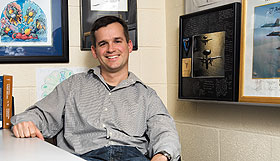  |
| HOME | THIS ISSUE | CALENDAR | GRANTS | BACK ISSUES | < BACK | NEXT > |
Navy physiologist earns doctorate in educational psychology by Kala Kachmar - May 5, 2008 | ||||
| Two pilots in the air suddenly become short of breath. Their heads pound, their vision begins to blur. They are becoming hypoxic – oxygen-deprived – as the cabin pressure drops. They must take prompt action if they’re to survive. Lt. Cmdr. Anthony Artino, a Navy aerospace physiologist, is responsible for training pilots in emergency situations like these. And that’s why he’s at UConn. Artino, who will graduate this month with a Ph.D. in educational psychology, came to the University three years ago to learn how to better train his students. Once every three years, the Navy chooses one aerospace physiologist from a group of about 100 to receive a full scholarship for a Ph.D. with pay. Artino was chosen. The only catch was he had to finish in three years. “I chose the educational psychology program because I want to learn how best to train the people I work with,” he says. “I’m responsible for teaching them how to survive in emergency situations.” Artino has a bachelor’s degree in biomedical engineering, a master’s in cardiopulmonary and high altitude physiology, and a master’s in instructional systems. “I already know the necessary ‘science’ part of my job,” Artino says. “I was interested in learning more about the teaching and learning aspects of what I do.” Artino’s dissertation is about improving the effectiveness of online learning. “I’ve been developing survey instruments to determine the beliefs, emotions, and behaviors of those who do well in online courses and those who do not,” he says. “Online learning is a great tool if students are willing to get engaged.” He has also been examining how negative emotions affect performance, and how the difference between a course being optional and a course being required affects student performance. During his time at UConn, Artino has had 11 peer-reviewed journal articles accepted for publication, with seven already published.
He has also presented 16 different papers at various international, national, and regional conferences, including several papers for the American Education Research Association (AERA), one of the biggest and most prestigious research associations in the field. “Tony is one of the most productive graduate students I’ve ever had,” says Scott Brown, professor of educational psychology, his advisor. This year, Artino won the Outstanding Doctoral Student Research Award from the Neag School of Education. He also won the Lorne H. Woollatt Distinguished Paper Award from the Northeastern Educational Research Association, and the Ellingson Distinguished Paper Award for a paper he published in Aviation, Space, and Environmental Medicine. He worked as a research assistant for the Teachers for a New Era project, an initiative of the Carnegie Corp. of New York to improve the quality of teaching by bringing better teacher education programs to higher education institutions. In addition to his other responsibilities, Artino was president of the Neag Graduate Student Association in 2007-08, and previously served as student representative to his program’s faculty council. “He brought back the voice of the students to the cognition and instruction program,” Brown says. Artino also co-taught an undergraduate course in educational psychology, and was the instructor for a graduate course in learning theories last summer. He has been assigned after graduation to the Uniformed Services University of the Health Sciences in Bethesda, Md., as an assistant professor in the department of preventive medicine. “My plan,” he says, “is to keep my hand in the research world as I go along in my naval career.” |
| ADVANCE HOME UCONN HOME |

